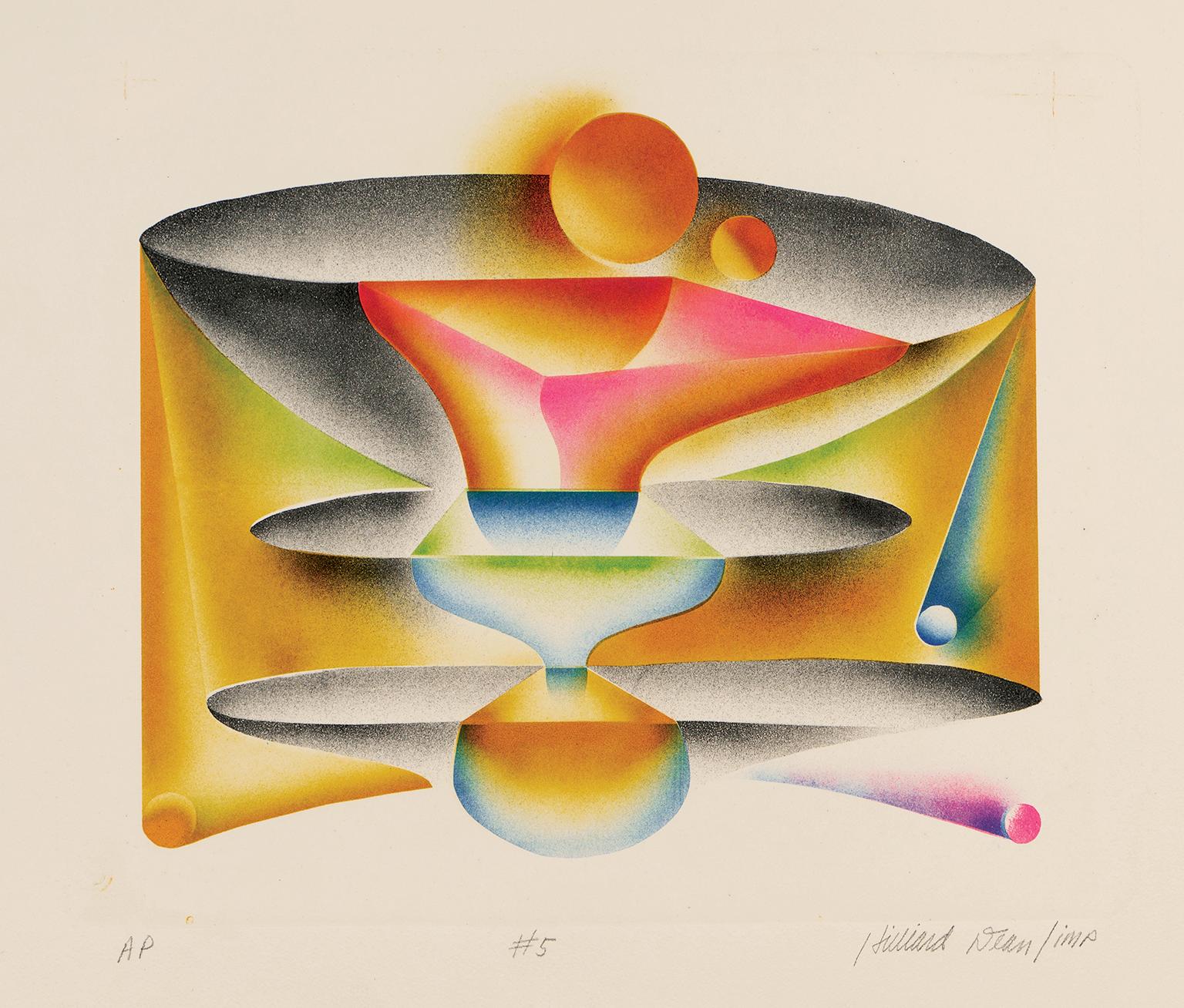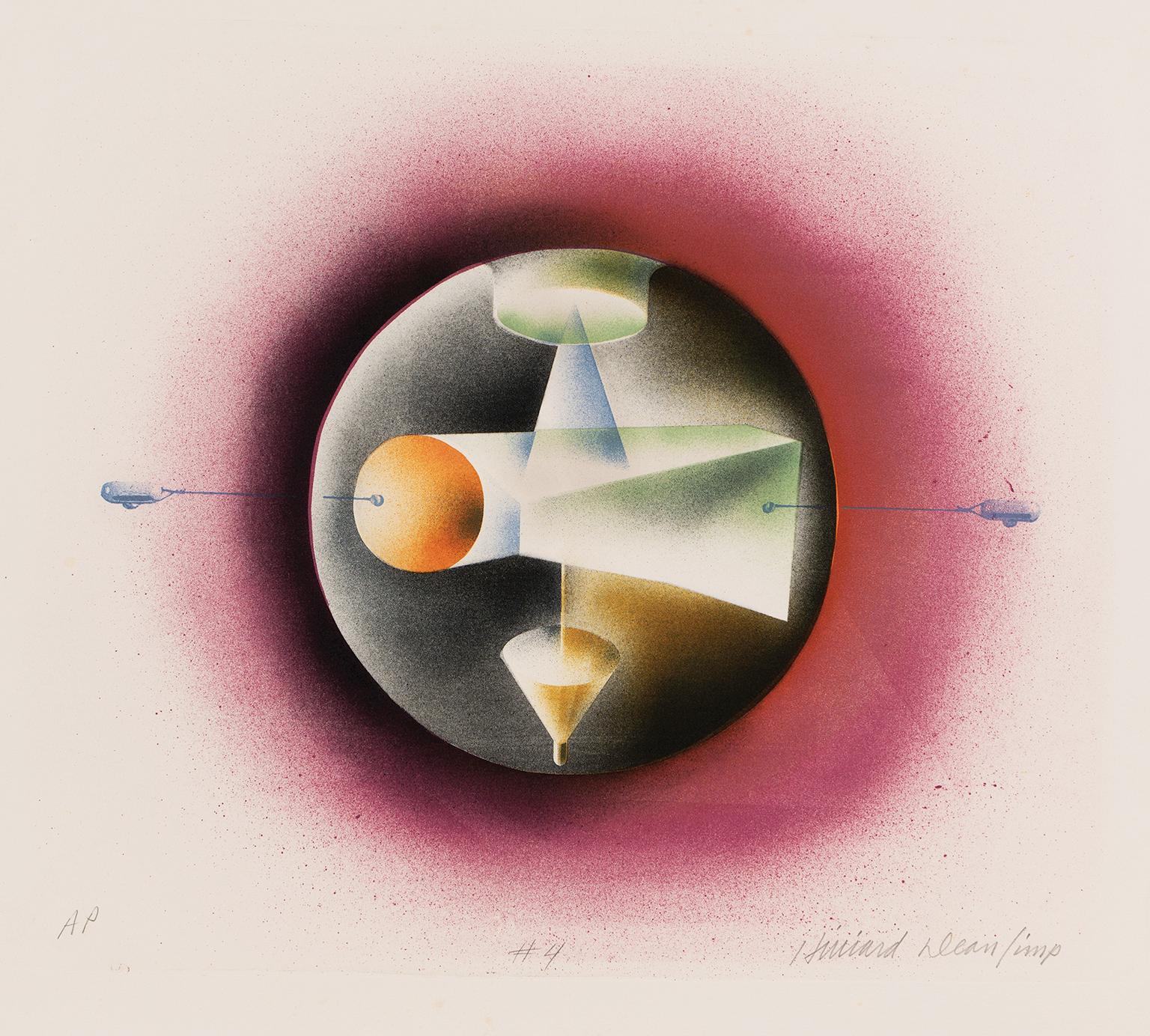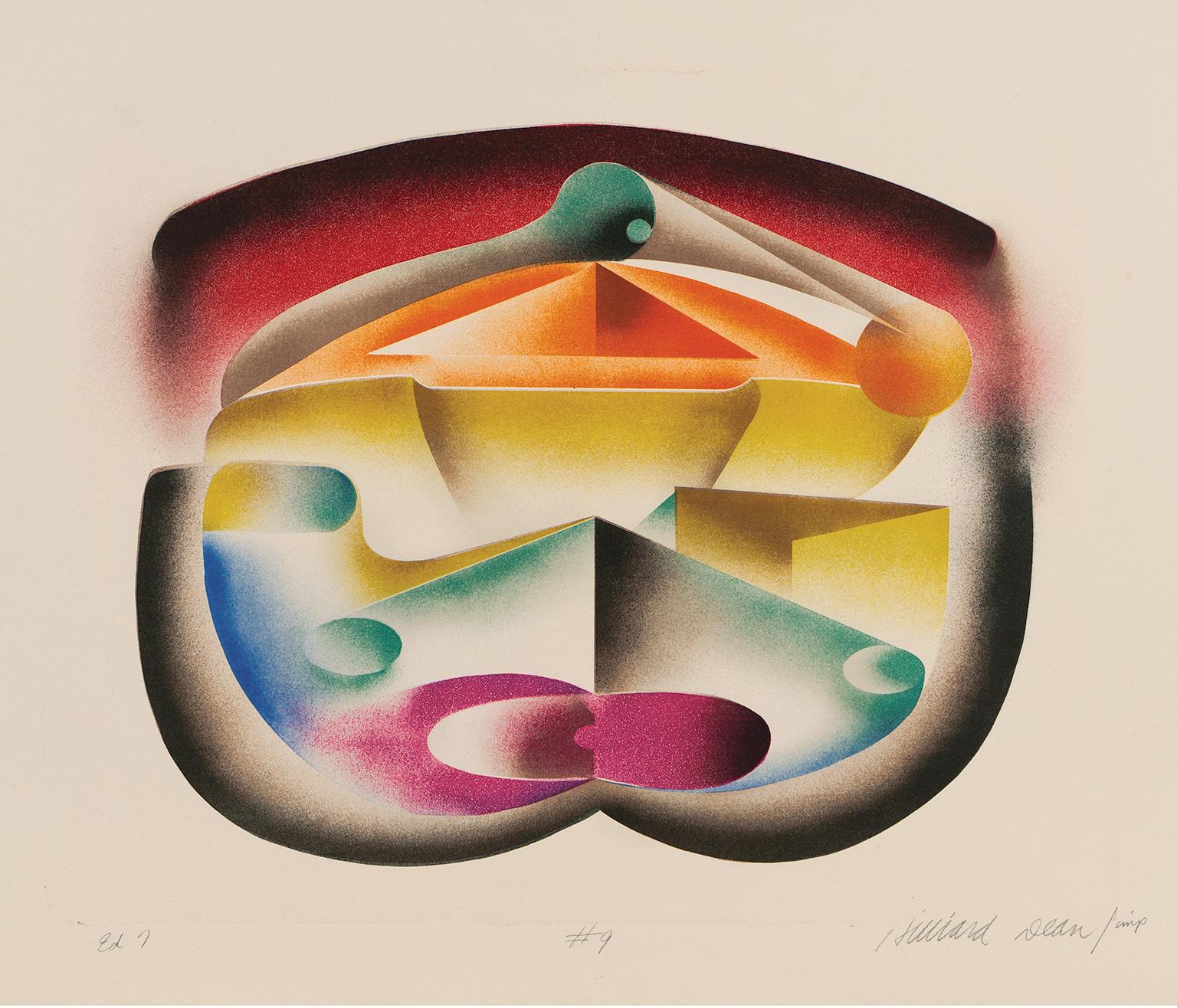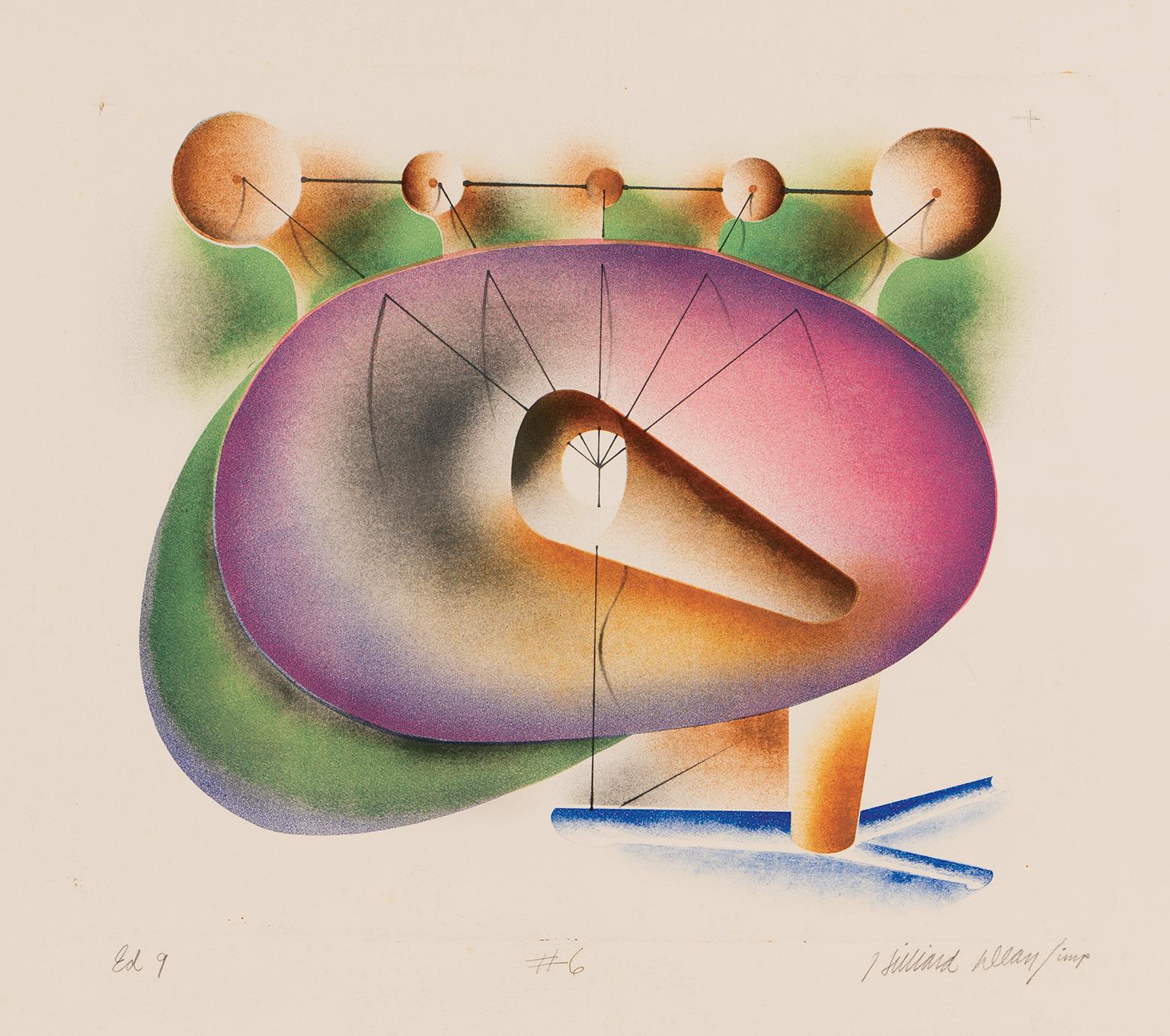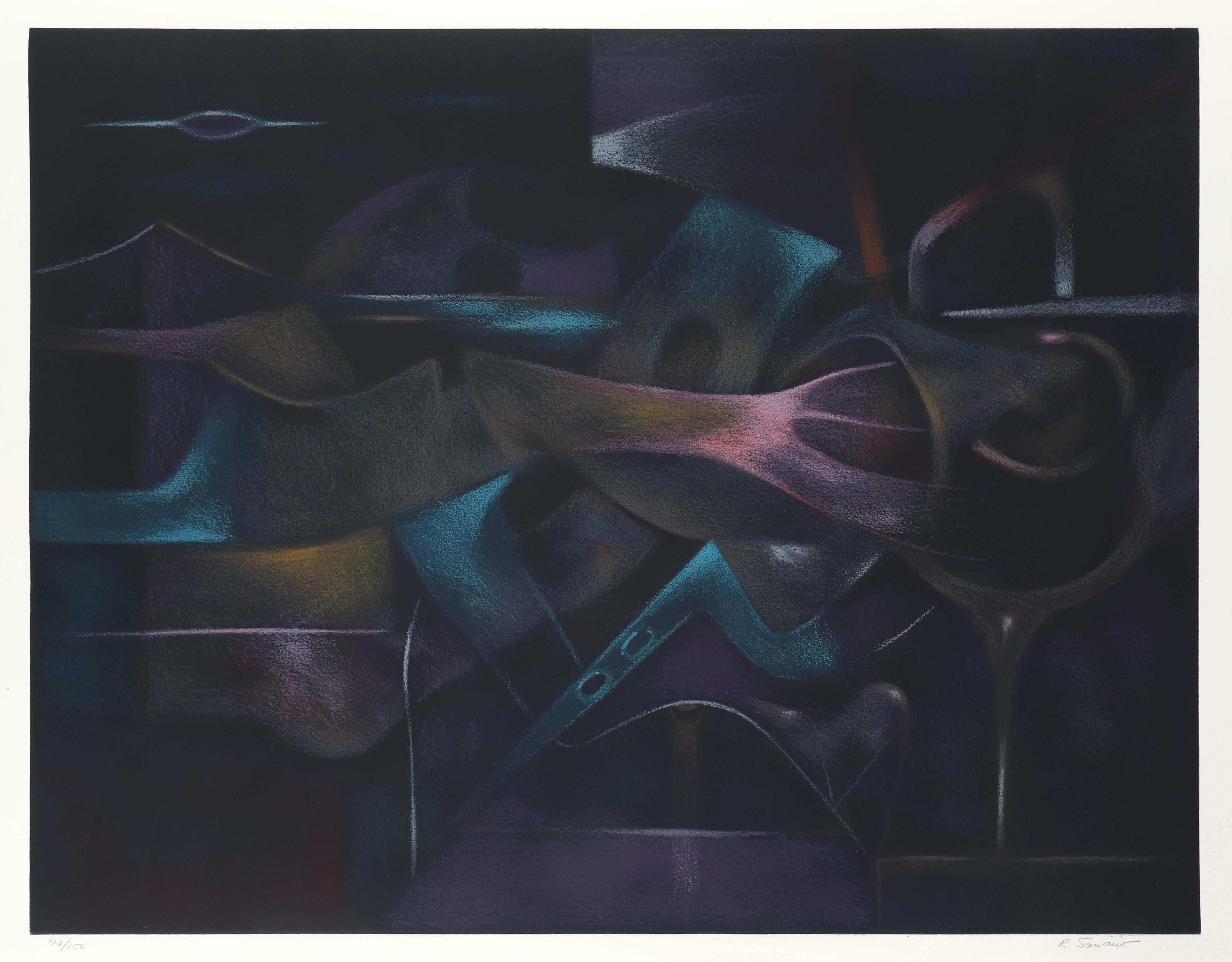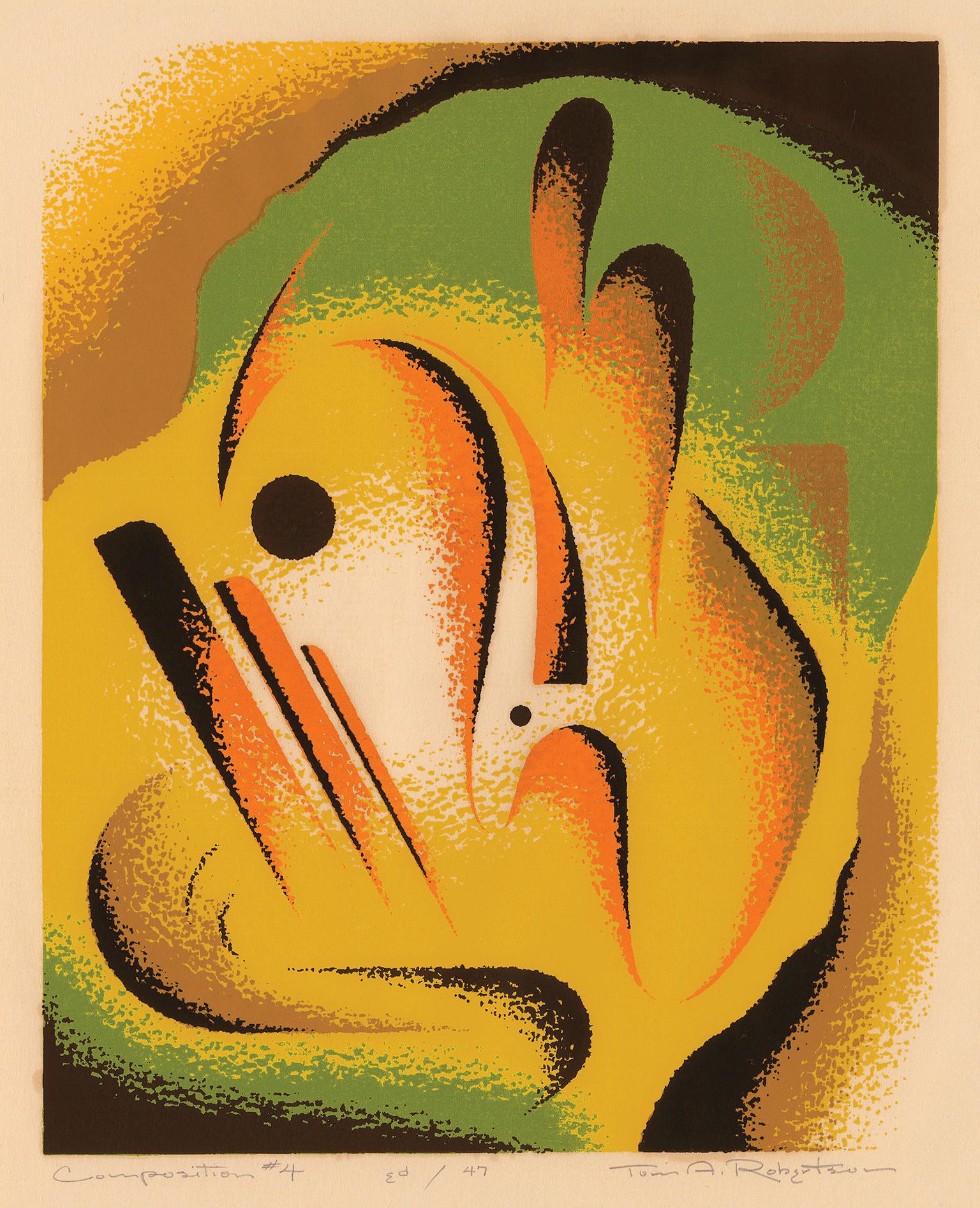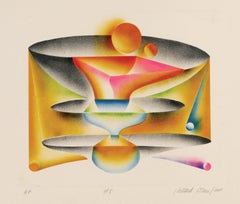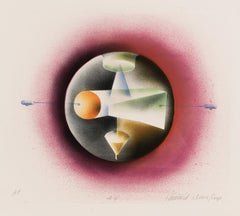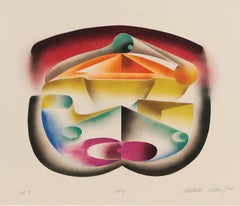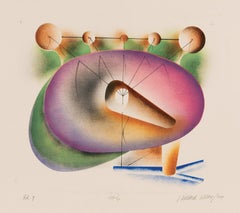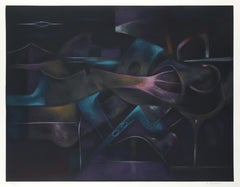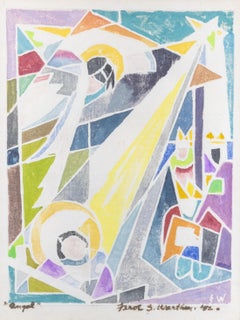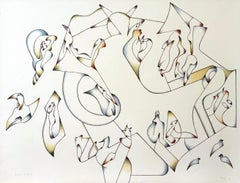Items Similar to #3 — Modernist Abstraction — African American Artist
Want more images or videos?
Request additional images or videos from the seller
1 of 6
Hilliard Dean#3 — Modernist Abstraction — African American Artist1970
1970
$2,200
£1,665.06
€1,911.82
CA$3,134.08
A$3,398.99
CHF 1,785.28
MX$41,286.68
NOK 22,339.92
SEK 21,034.28
DKK 14,273.06
About the Item
Hilliard Reynolds Dean, '#3', color lithograph, 1970, edition not stated but small. Signed and titled in pencil. A fine impression, with fresh colors, on Arches, heavy, cream wove paper; the full sheet with margins (3 to 5 inches); minor scattered foxing in the outside margins, well away from the image, otherwise in excellent condition. Printed by the artist. Archivally matted to museum standards, unframed.
Image size 13 1/2 x 18 inches (343 x 457 mm); sheet size 22 1/4 x 24 3/8 inches (565 x 619 mm).
ABOUT THE ARTIST
Hilliard Reynolds Dean (b. 1933) is a painter and printmaker of figurative and abstract works active in the Washington DC area. His work is referenced in 'Afro-American Artists, A Bibliographical Directory,' edited by Theresa Dickason Cederholm, Boston Public Library, 1973, and in 'Free Within Ourselves: African-American Artists in the Collection of the National Museum of American Art,' 1992. Dean’s graphic works are represented in the collection of the Smithsonian American Art Museum.
- Creator:Hilliard Dean (1933, American)
- Creation Year:1970
- Dimensions:Height: 13.5 in (34.29 cm)Width: 18 in (45.72 cm)
- Medium:
- Movement & Style:
- Period:
- Condition:
- Gallery Location:Myrtle Beach, SC
- Reference Number:Seller: 1038461stDibs: LU532310224192
About the Seller
5.0
Recognized Seller
These prestigious sellers are industry leaders and represent the highest echelon for item quality and design.
Platinum Seller
Premium sellers with a 4.7+ rating and 24-hour response times
Established in 1995
1stDibs seller since 2016
322 sales on 1stDibs
Typical response time: 1 hour
Associations
International Fine Print Dealers Association
- ShippingRetrieving quote...Shipping from: Myrtle Beach, SC
- Return Policy
Authenticity Guarantee
In the unlikely event there’s an issue with an item’s authenticity, contact us within 1 year for a full refund. DetailsMoney-Back Guarantee
If your item is not as described, is damaged in transit, or does not arrive, contact us within 7 days for a full refund. Details24-Hour Cancellation
You have a 24-hour grace period in which to reconsider your purchase, with no questions asked.Vetted Professional Sellers
Our world-class sellers must adhere to strict standards for service and quality, maintaining the integrity of our listings.Price-Match Guarantee
If you find that a seller listed the same item for a lower price elsewhere, we’ll match it.Trusted Global Delivery
Our best-in-class carrier network provides specialized shipping options worldwide, including custom delivery.More From This Seller
View All#5 — Modernist Abstraction — African American Artist
Located in Myrtle Beach, SC
Hilliard Dean, '#5', color lithograph, 1970, edition not stated but small. Signed, titled, and annotated 'AP' in pencil. Dated 'June 11, 70' in pencil in...
Category
1970s Contemporary Abstract Prints
Materials
Lithograph
#4 — Modernist Abstraction — African American Artist
Located in Myrtle Beach, SC
Hilliard Dean, '#4', color lithograph, 1970, edition not stated but small. Signed, titled, and annotated 'AP' in pencil. Dated 'May 1970' in pencil in th...
Category
1970s Contemporary Abstract Prints
Materials
Lithograph
'#9' — Modernist Abstraction — African American Artist
Located in Myrtle Beach, SC
Hilliard Dean, '#9', color lithograph, 1970, edition 7. Signed, titled, and annotated 'Ed 7' in pencil. A fine impression, with fresh colors, on Arches, ...
Category
1970s Contemporary Abstract Prints
Materials
Lithograph
#6 — Modernist Abstraction — African American Artist
Located in Myrtle Beach, SC
Hilliard Dean, '#6', color lithograph, 1970, edition 9. Signed, titled, and annotated 'Ed 9' in pencil. A fine impression, with fresh colors, on Arches, ...
Category
1970s Contemporary Abstract Prints
Materials
Lithograph
'Composition # 4' — Mid-Century Modernism
By Thomas A. Robertson
Located in Myrtle Beach, SC
Thomas Robertson, 'Composition #4,' color serigraph, edition 47, c. 1940. Signed, titled, and annotated 'Ed/47' in pencil. A superb, painterly impression, with fresh colors, on buff wove paper, the full sheet with margins (1 to 2 inches), in excellent condition. Matted to museum standards, unframed.
Image size: 10 9/16 x 8 1/2 inches (268 x 216 mm); sheet size 13 x 12 1/2 inches (330 x 318 mm).
An impression of this work is represented in the collection of the National Gallery of Art.
ABOUT THE ARTIST
Born in Little Rock, Arkansas, Thomas Arthur Robertson (1911-1976) was the son of an attorney. Although his father, a co-owner of the Arkansas Law School, insisted that his son study there, after graduating, Robertson enrolled at the Adrian Brewer...
Category
1940s Abstract Abstract Prints
Materials
Screen
'Sculpturegraph' — Modernist Abstraction, Contemporary African American Artist
Located in Myrtle Beach, SC
George Rogers, 'Sculpturegraph' (Black, Gray, and Silver), color sculpturegraph, edition 40, 1984. Signed, dated, titled, and numbered '25/40' in pencil. A superb, richly-inked, pain...
Category
1980s American Modern Abstract Prints
Materials
Monoprint
You May Also Like
Rafael Soriano Lithograph, Untitled
Located in Miami, FL
Rafael Soriano
Untitled, 1990s
Lithograph
Ed 74 of 150
33 x 26 in
Category
Late 20th Century Abstract Abstract Prints
Materials
Lithograph
(Abstraction) by DD
Located in New York, NY
This image is an extravaganza of modernist motifs. The monogram 'D.D.' is at the lower right.
Category
Mid-20th Century American Modern Abstract Prints
Materials
Woodcut
Angel
Located in Missouri, MO
Angel, 1952
Ferol K. Sibley Warthen (American, 1890-1986)
Color Woodblock Print
6.5 x 5 inches
16 x 13.75 inches with frame
Signed Lower Right
Titled Lower Left
Born 1890, Died 1986...
Category
1950s American Modern Abstract Prints
Materials
Color
ABSTRACT 2, Signed Lithograph, Modernist Drawing, Free Form Line and Shapes
By Jan Voss
Located in Union City, NJ
Abstract 2 is an original hand drawn lithograph by the German artist Jan Voss, printed using hand lithography techniques on archival Arches paper 100% acid free. Abstract 2 presents ...
Category
1970s Abstract Abstract Prints
Materials
Lithograph
Cubist Composition, Lithograph by Jean Helion
By Jean Hélion
Located in Long Island City, NY
Jean Hélion was a French painter (1904 - 1987) whose abstract work of the 1930's established him as a leading modernist. His mid-career rejection of abstraction was followed by nearl...
Category
1930s Cubist Abstract Prints
Materials
Lithograph
Untitled
By Charles Houghton Howard
Located in New York, NY
Charles Houghton Howard was born in Montclair, New Jersey, the third of five children in a cultured and educated family with roots going back to the Massachusetts Bay colony. His father, John Galen Howard, was an architect who had trained at M.I.T. and the École des Beaux-Arts in Paris and apprenticed in Boston with Henry Hobson Richardson. In New York, the elder Howard worked for McKim, Mead and White before establishing a successful private practice. Mary Robertson Bradbury Howard, Charles’s mother, had studied art before her marriage. John Galen Howard moved his household to California in 1902 to assume the position of supervising architect of the new University of California campus at Berkeley and to serve as Professor of Architecture and the first Dean of the School of Architecture (established in 1903). The four Howard boys grew up to be artists and all married artists, leaving a combined family legacy of art making in the San Francisco Bay area that endures to this day, most notably in design, murals, and reliefs at the Coit Tower and in buildings on the Berkeley campus.
Charles Howard graduated from the University of California at Berkeley in 1921 as a journalism major and pursued graduate studies in English at Harvard and Columbia Universities before embarking on a two-year trip to Europe. Howard went to Europe as a would-be writer. But a near-religious experience, seeing a picture by Giorgione in a remote town outside of Venice, proved a life-altering epiphany. In his own words, “I cut the tour at once and hurried immediately back to Paris, to begin painting. I have been painting whenever I could ever since” (Charles Howard, “What Concerns Me,” Magazine of Art 39 [February 1946], p. 63). Giorgione’s achievement, in utilizing a structured and rational visual language of art to convey high emotion on canvas, instantly convinced Howard that painting, and not literature, offered the best vehicle to express what he wanted to say. Howard returned to the United States in 1925, confirmed in his intent to become an artist.
Howard settled in New York and supported himself as a painter in the decorating workshop of Louis Bouché and Rudolph Guertler, where he specialized in mural painting. Devoting spare time to his own work, he lived in Greenwich Village and immersed himself in the downtown avant-garde cultural milieu. The late 1920s and early 1930s were the years of Howard’s art apprenticeship. He never pursued formal art instruction, but his keen eye, depth of feeling, and intense commitment to the process of art making, allowed him to assimilate elements of painting intuitively from the wide variety of art that interested him. He found inspiration in the modernist movements of the day, both for their adherence to abstract formal qualities and for the cosmopolitan, international nature of the movements themselves. Influenced deeply by Surrealism, Howard was part of a group of American and European Surrealists clustered around Julien Levy. Levy opened his eponymously-named gallery in 1931, and rose to fame in January 1932, when he organized and hosted Surrealisme, the first ever exhibition of Surrealism in America, which included one work by Howard. Levy remained the preeminent force in advocating for Surrealism in America until he closed his gallery in 1949. Howard’s association with Levy in the early 1930s confirms the artist’s place among the avant-garde community in New York at that time.
In 1933, Howard left New York for London. It is likely that among the factors that led to the move were Howard’s desire to be a part of an international art community, as well as his marriage to English artist, Madge Knight...
Category
20th Century American Modern Abstract Drawings and Watercolors
Materials
Paper, Gouache, Graphite
